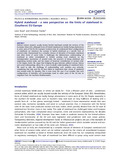Zitierlink:
https://doi.org/10.1080/23311886.2024.2352911| DC Element | Wert | Sprache |
|---|---|---|
| dc.contributor.author | Faust, Lene | - |
| dc.contributor.author | Franke, Christian | - |
| dc.date.accessioned | 2025-03-17T11:03:45Z | - |
| dc.date.available | 2025-03-17T11:03:45Z | - |
| dc.date.issued | 2024 | de |
| dc.description | Finanziert aus dem DFG-geförderten Open-Access-Publikationsfonds der Universität Siegen für Zeitschriftenartikel | de |
| dc.description.abstract | Political science research usually locates limited statehood outside the territory of the European Union (EU), although forms of limited statehood are hardly foreign phenomena in some parts of the EU, for example, Southern Italy. To understand these configurations of statehood, we introduce the concept of hybrid statehood as a specific form of societal order, characterized by a complex mixture of elements of European statehood and other forms of social order. It challenges the dichotomous understanding of statehood as either consolidated or limited, putting more emphasis on the interdependent coexistence of societal order, the practices of doing statehood and negotiating societal order, and the impact of historical constellations of societal order in the longue durée. We argue that bridging the gap between political science, history and social anthropology allows for a more in-depth understanding of statehood there. We need to take the challenge of understanding such societies very seriously, considering that Italy and the EU have failed to implement their visions of statehood and societal order for decades. This is even more the case if we consider that such configurations of hybridity will increasingly travel to other parts of the EU due to migration from the southern Mediterranean. | - |
| dc.identifier.doi | https://doi.org/10.1080/23311886.2024.2352911 | de |
| dc.identifier.uri | https://dspace.ub.uni-siegen.de/handle/ubsi/2904 | - |
| dc.identifier.urn | urn:nbn:de:hbz:467-29047 | - |
| dc.language.iso | en | de |
| dc.subject.ddc | 330 Wirtschaft | de |
| dc.subject.other | Hybrid statehood | en |
| dc.subject.other | Societal orders | en |
| dc.subject.other | Southern EU | en |
| dc.subject.other | Hybride Staatlichkeit | de |
| dc.subject.other | Gesellschaftliche Ordnungen | de |
| dc.subject.other | Südliche EU | de |
| dc.title | Hybrid statehood - a new perspective on the limits of statehood in (Southern) EU-Europe | en |
| dc.type | Article | de |
| item.fulltext | With Fulltext | - |
| ubsi.publication.affiliation | Fakultät III - Wirtschaftswissenschaften, Wirtschaftsinformatik und Wirtschaftsrecht | de |
| ubsi.source.issued | 2024 | de |
| ubsi.source.issuenumber | 10 | de |
| ubsi.source.link | Cogent Social Sciences ; 10, 2352911. - https://doi.org/10.1080/23311886.2024.2352911 | de |
| ubsi.source.pages | 12 | de |
| ubsi.source.title | Cogent Social Sciences | de |
| Enthalten in den Sammlungen: | Geförderte Open-Access-Publikationen | |
Dateien zu dieser Ressource:
| Datei | Beschreibung | Größe | Format | |
|---|---|---|---|---|
| Hybrid_statehood.pdf | 324.37 kB | Adobe PDF |  Öffnen/Anzeigen |
Diese Ressource ist urheberrechtlich geschützt. |
Seitenansichten
34
checked on 31.03.2025
Download(s)
2
checked on 31.03.2025
Google ScholarTM
Prüfe
Prüfe
Alle Ressourcen in diesem Repository sind urheberrechtlich geschützt, soweit nicht anderweitig angezeigt.

